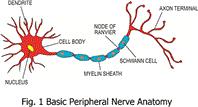The term peripheral neuropathy describes a problem with the functioning of the nerves outside of the spinal cord. The symptoms of a neuropathy may include numbness, weakness, burning pain (especially at night), and loss of reflexes. The pain may be severe and disabling.
There are many possible causes of peripheral neuropathy. Some of the most common causes include repetitive activities such as typing or working on an assembly line. In this case, the neuropathy may be isolated to the upper extremities, such as with carpal tunnel syndrome.
Pressure on a nerve can cause a peripheral neuropathy. For example, pressure on a nerve that comes out from the groin to the skin in front of the upper thigh can cause burning and tingling in this location. This particular problem is called meralgia paresthetica and can be caused by wearing a tight belt or other restrictive clothing. Additionally, it can result from being overweight or pregnant.
Many illnesses can result in peripheral neuropathy. Some examples include diabetes, syphilis, AIDS, and kidney failure. Other causes include nutritional deficiencies, such as B-12 and folate deficiency, medications and chemical exposures. Medications known to cause peripheral neuropathy, include several AIDS drugs (DDC and DDI), antibiotics (metronidazole, an antibiotic used for Crohn's disease, isoniazid used for TB), gold compounds (used for rheumatoid arthritis), some chemotherapy drugs (such as vincristine and others) and many others. Chemicals known to cause peripheral neuropathy include alcohol, lead, arsenic, mercury and organophosphate pesticides.
Some peripheral neuropathies are associated with diseases which are inherited (hereditary). Others are related to infectious processes (such as Guillian-Barre syndrome).
